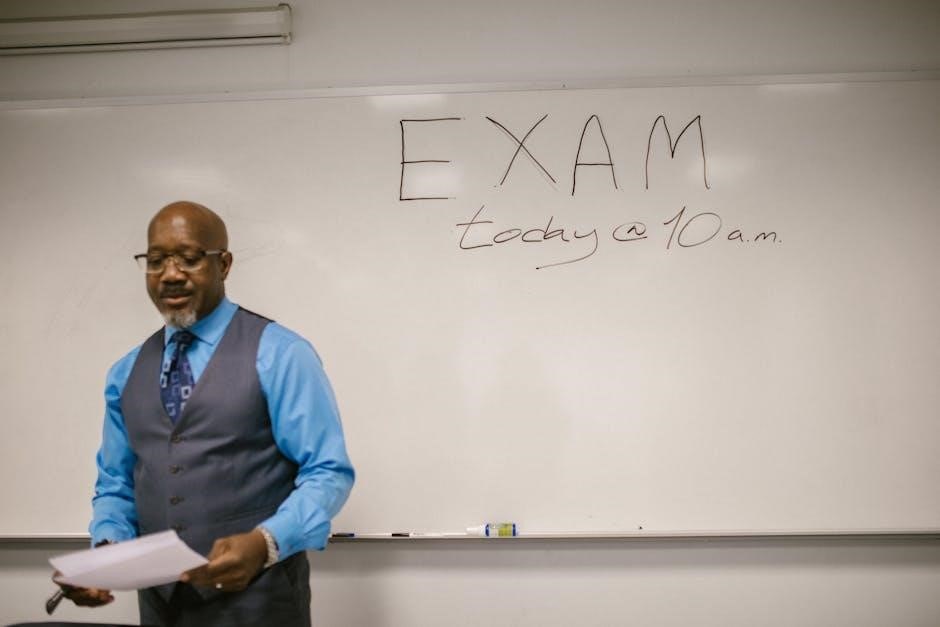The introduction to TABE examiner instructions for remote testing provides guidance on administering tests remotely using web conferencing services and ProctorU for secure online testing sessions always.
Overview of Remote Testing
Remote testing allows test administrators to proctor exams online using web conferencing services‚ enabling students to take tests from any location. This method is particularly useful for students who cannot physically attend a testing center. The remote testing process involves a test administrator coordinating a web meeting with the student‚ and the test is administered in the same way as it would be in a physical testing center. The rules and guidelines for remote testing are the same as those for on-site testing‚ ensuring the integrity and security of the testing process. Test administrators must be trained and familiar with the testing platform and software to ensure a smooth and successful remote testing experience for students. The use of remote testing has expanded access to testing opportunities‚ increasing flexibility and convenience for students. Remote testing is a secure and reliable method of test administration.
Training Requirements for Test Administrators
Test administrators must complete specific training requirements to administer remote tests. They must finish the Best Plus 2.0 Remote Testing Administration‚ TABE 11/12 Remote Testing Administration training‚ and/or CASAS Proctor Remote Testing Training. These training sessions are facilitated by Train PD and can be completed virtually or online through the PD Portal. A certificate of completion is required for monitoring purposes‚ ensuring that test administrators are properly trained and equipped to proctor remote tests. The training covers essential topics‚ such as test security‚ technical requirements‚ and test administration procedures. By completing the training‚ test administrators can confidently and effectively administer remote tests‚ ensuring a secure and reliable testing experience for students. The training requirements are in place to maintain the integrity of the testing process and ensure that test administrators are competent in remote testing procedures.

Remote Testing Guidelines
Remote testing guidelines ensure secure and reliable online testing sessions always follow standard procedures and protocols carefully.
Rules for Remote Testing
Rules for remote testing are established to ensure the integrity and security of the testing process. The rules are designed to mimic the on-site testing experience as closely as possible. Test administrators must adhere to these rules to maintain the validity of the test results. The rules include guidelines for test administration‚ proctoring‚ and communication with test-takers. Test administrators must also ensure that test-takers are aware of and comply with the rules. The rules for remote testing are in place to protect the security and integrity of the test‚ and to ensure that all test-takers have a fair and equal opportunity to demonstrate their knowledge and skills. By following these rules‚ test administrators can help to ensure a successful and secure remote testing experience for all test-takers‚ which is essential for maintaining the credibility of the test results.
Test Examiner Requirements
Test examiners play a crucial role in remote testing‚ and they must meet specific requirements to ensure the integrity of the testing process. They must be trained and familiar with the TABE Online system and the remote testing platform. Test examiners must also have a certificate of completion for the remote testing training‚ which covers topics such as test administration‚ proctoring‚ and technical requirements. They must be able to communicate effectively with test-takers and provide clear instructions and support during the testing process. Additionally‚ test examiners must be able to troubleshoot technical issues and ensure that the testing environment is secure and free from distractions. By meeting these requirements‚ test examiners can help to ensure a successful and secure remote testing experience for all test-takers‚ which is essential for maintaining the credibility of the test results and ensuring fairness.

Examiner Instructions for Remote Testing
Examiner instructions for remote testing provide detailed guidance for test administrators always using web conferencing services.
ProctorU Remote Proctoring
ProctorU remote proctoring is a service that enables test administrators to proctor exams remotely using a web-based platform. This service allows for live proctoring‚ where a proctor monitors the test-taker in real-time‚ and recorded proctoring‚ where the test session is recorded for later review. ProctorU remote proctoring is designed to ensure the integrity of the testing process‚ preventing cheating and maintaining test security. The service is user-friendly‚ allowing test administrators to easily schedule and manage remote proctoring sessions. ProctorU remote proctoring also provides technical support to ensure a smooth testing experience. With ProctorU‚ test administrators can confidently administer remote tests‚ knowing that the proctoring process is secure and reliable. The use of ProctorU remote proctoring simplifies the remote testing process‚ making it easier to administer tests to test-takers in different locations. This service is an essential tool for remote testing.

Student Instructions for Remote Testing
Students receive instructions on remote testing procedures and technical requirements for a smooth testing experience always online.
General Information
General information for students taking the TABE test remotely includes an overview of the testing process and what to expect during the test session. The test administrator will provide instructions and ensure that all technical requirements are met. Students will need to have a computer or laptop with a webcam and microphone‚ as well as a stable internet connection. They will also need to create an account and login to the testing platform. The test administrator will monitor the test session and provide support as needed. Students will be able to ask questions and request help during the test; The general information section provides students with the information they need to prepare for the test and understand the remote testing process. This information is essential for a successful and stress-free testing experience. Students can review this information before the test to ensure they are prepared.
Technical Requirements
Technical requirements for remote TABE testing include a computer or laptop with a webcam and microphone‚ as well as a stable internet connection with a minimum speed of 1 Mbps. The device should have a compatible operating system and browser‚ such as Windows or macOS‚ and Google Chrome or Mozilla Firefox. A headset or speakers are also recommended to ensure clear audio. Additionally‚ the testing platform may require specific software or plugins to be installed‚ such as Adobe Flash or Java. The test administrator will provide instructions on how to check the system requirements and ensure that the device is compatible with the testing platform. It is essential to meet these technical requirements to ensure a smooth and successful testing experience. The technical requirements are outlined in detail to help students prepare and avoid any technical issues during the test.

Additional Resources
Additional resources include TABE Remote Proctoring FAQS and ACLs Test Help Blog for guidance and support always available online.
TABE Remote Proctoring FAQS
TABE Remote Proctoring FAQS provide answers to frequently asked questions about remote testing‚ including technical requirements and test administration procedures. The FAQs are available online and can be accessed by test administrators and students. They offer guidance on topics such as system requirements‚ test security‚ and proctoring protocols. The FAQs are an essential resource for anyone involved in remote testing‚ as they help to ensure a smooth and successful testing experience. By consulting the FAQs‚ test administrators can troubleshoot common issues and resolve problems quickly‚ minimizing disruptions to the testing process. Overall‚ the TABE Remote Proctoring FAQS are a valuable resource that support the successful implementation of remote testing. They are regularly updated to reflect changes in testing procedures and protocols.
ACLs Test Help Blog
The ACLs Test Help Blog is a valuable resource for test administrators‚ providing information and support for the administration of TABE tests. The blog offers a range of topics‚ including test administration‚ scoring‚ and interpretation‚ as well as tips and best practices for using the DRC INSIGHT Portal. Test administrators can access the blog to find answers to common questions and to stay up-to-date on the latest developments and updates. The blog is regularly updated with new content‚ ensuring that test administrators have access to the most current information and resources. By visiting the ACLs Test Help Blog‚ test administrators can enhance their knowledge and skills‚ ultimately improving the testing experience for students. The blog is an essential tool for anyone involved in TABE test administration‚ providing timely and relevant information.